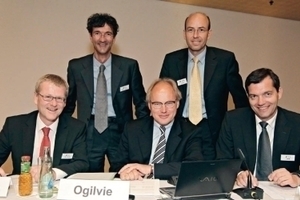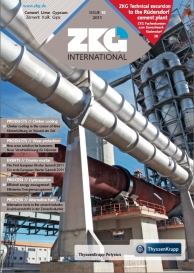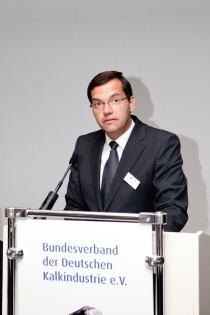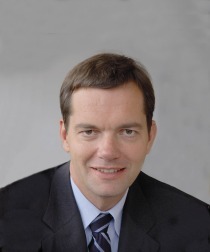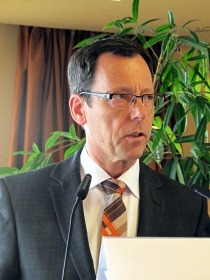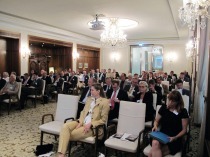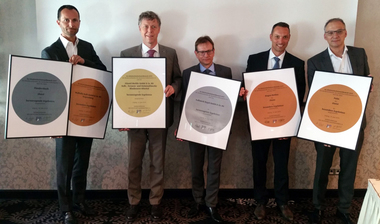Products of the lime industry indispensable for Germany as an industrial location
“The German economy is booming. At the beginning of 2010 we still expected a growth rate of 1.75 % in that year, but now it is clear that the economy performed outstandingly in 2010 and that the achieved growth rate of 3.6 % is the biggest since the German reunion” says Michael Liell, Executive Board Member of Rheinkalk GmbH, Wülfrath, and President of the Bundesverbandes der Deutschen Kalkindustrie e.V. (German Lime Industry Association) during its Annual General Meeting on 09.06.2011 in Dresden/Germany (Fig. 1).
In the business report that he presented to the Annual General Meeting of the BVK, Liell outlined the reasons for the economic upswing and emphasized the role of the manufacturing industry as the driving force for German and European economic growth. “The crisis and the subsequent upswing must have made clear to everybody that Germany’s strength is and will remain its industrial, manufacturing basis. The government must ensure that this basis is maintained and has to reinstate the general conditions needed in order to keep this basis in Germany”, stated the Association’s Chairman. In order to secure the industrial value creation chains and thus underpin the levels of prosperity and social benefits, industrial investments must again become realizable and economically feasible.
He particularly stressed the necessity for reliable, climate-compatible and affordable energy supplies – meaning fuels required by the lime industry and electrical power. Government energy policy decisions should again be more strongly based on rational considerations. Liell criticized the early withdrawal from the nuclear energy programme and pointed out that the International Energy Agency fears that the unilateral German action will endanger the security of supply in the whole of Europe.
Liell sees further risks – in addition to rising electricity and energy prices – in the increasing CO2 certificate prices, in the Euro crisis due to the necessity for massive financial aid for individual EU countries and in the still unstable global economic situation. Germany, too, has to continue consolidating her public finances.
Nevertheless, he expects further economic growth in 2011. The export economy is very strong indeed, and investments are picking up because factories are working to full capacity. Although the upswing has been borne up to now by foreign trade, it is now also boosting domestic demand. This is developing into an important factor in the country’s further economic development.
Fig. 2: Sales of unburnt products again decreased in 2010, falling from 21 million t in 2008 and approx. 19 million t in 2009 to 18 million t in 2010. This represented a further minus of 4.9 %. Less than half of these sales went to the building industry.
However, the 2010 result for burnt products is totally different: In 2010 the quantity supplied to industrial customers, particularly the iron and steel industry, jumped from 2.4 million t to 3.1 million t. This was a rise of almost 30 %. Sales for use on the environmental protection sector rose moderately from 1.31 million t to 1.36 million t. In total, 6.4 million t of burnt product were sold in 2010, which is 14.3 % more than in 2009.
In line with the general trend, the lime industry’s sales development had also developed positively in 2011. In the first quarter year sales of unburnt products were at 3.784 million t compared to the 3.315 million t in 2010, representing an increase of 14.1 % over the same period of last year. In the case of burnt products, 1.591 million t were sold in the first quarter of 2011 compared to 1.439 million t in 2010, which is a rise of 10.6 %. As regards the building industry, the situation has also developed positively, with a plus of 30.4 %. The Chairman expects results to progress well throughout the rest of this year.
The Managing Director of the National Association, Martin Ogilvie, submitted the report and accounts for 2010/2011 to the members’ meeting and explained the most important points. Ogilvie stressed that the products of the lime industry were indispensable for Germany as an industrial location, because limestone and lime were the basis for numerous industrial value creation chains. The work of the Association is currently focused on lobbying work in Berlin and Brussels – in conjunction with the bbs, the BDI and in co-operation with the energy-intensive industries – particularly with respect to the national energy and climate policies and the modalities of emission trading in the third trading period. “The energy policy, EEG, ETS, energy taxes, energy management systems, assurance of raw materials supplies and state climate protection laws are just some of the subjects that demand our further commitment”, said Ogilvie.
The president of the Monopolies and Mergers Commission, Andreas Mundt (Fig. 3), gave a lecture with the title of “A Plea for a Competition-Oriented Energy Policy”. He critically examined the present energy policy of the German Federal Government. State intervention was planned in so many areas that competition on the energy sector would be reduced instead of being promoted. www.kalk.de

